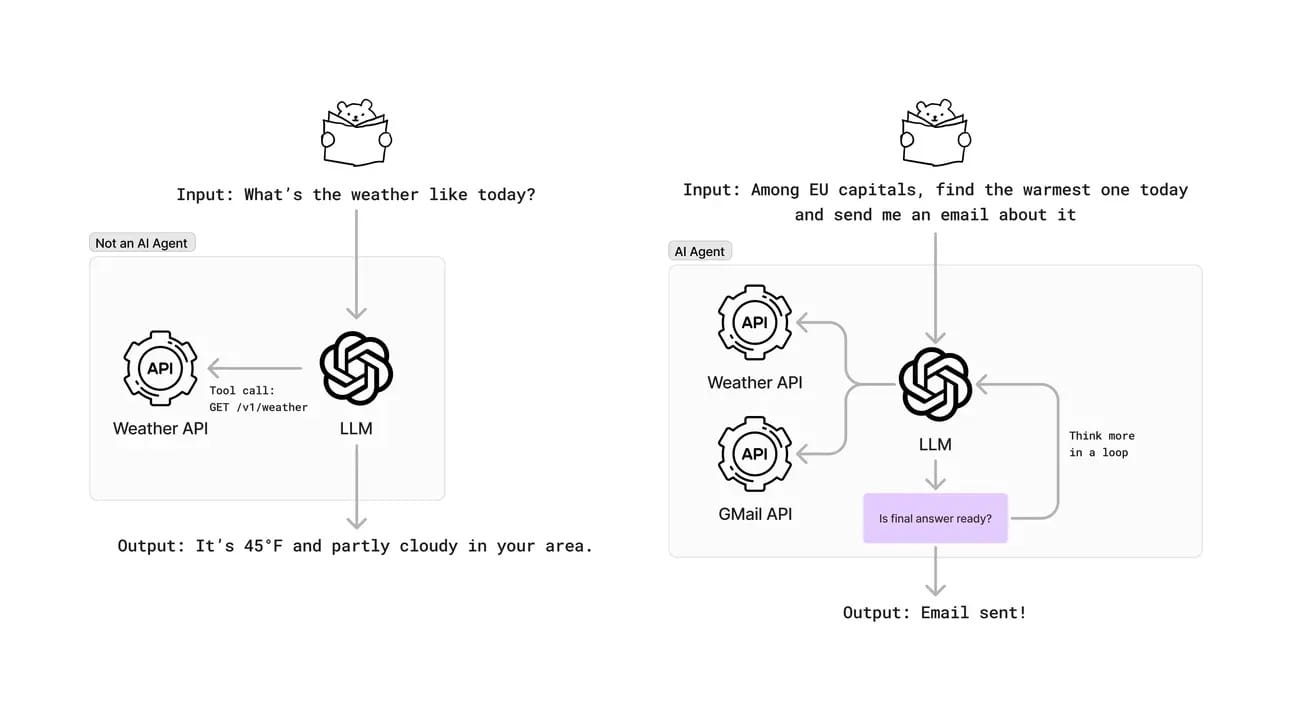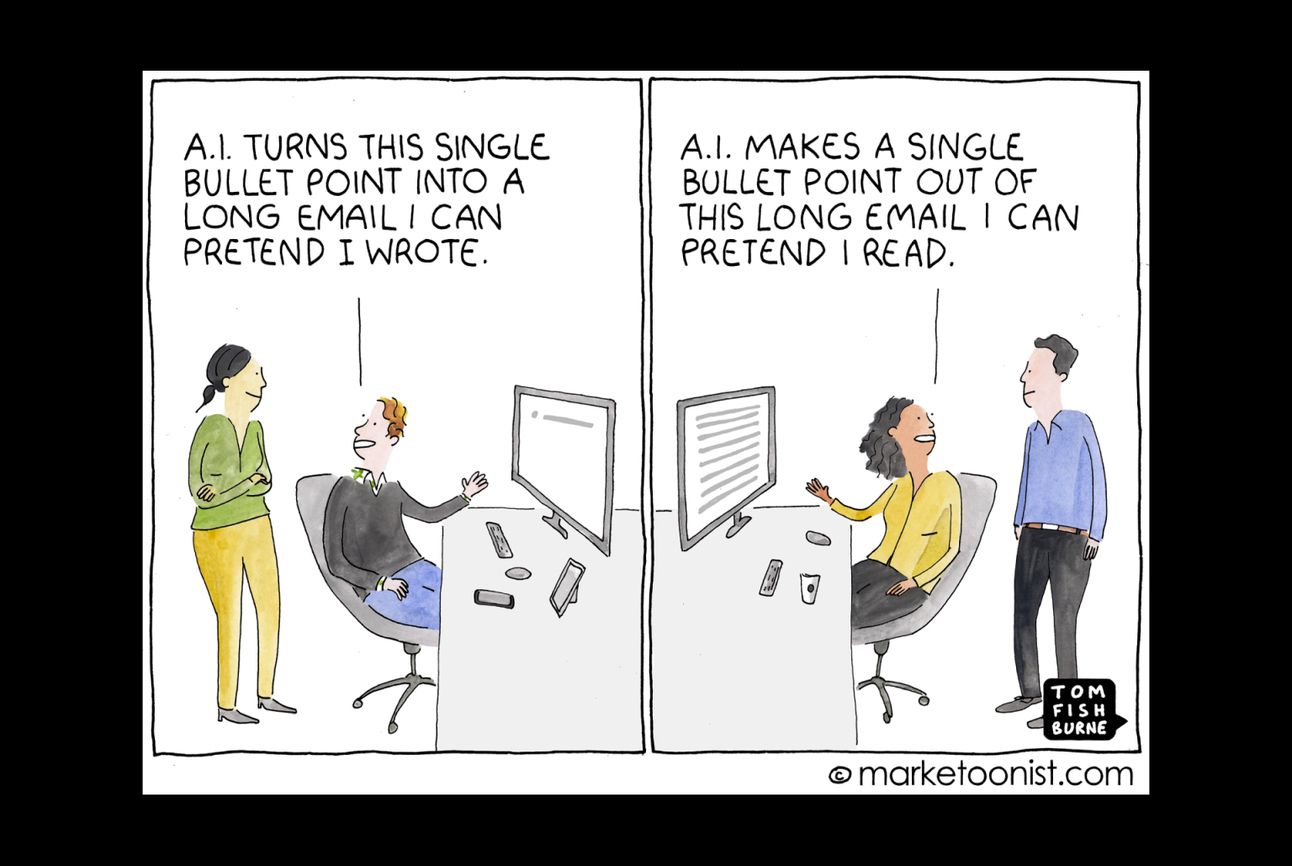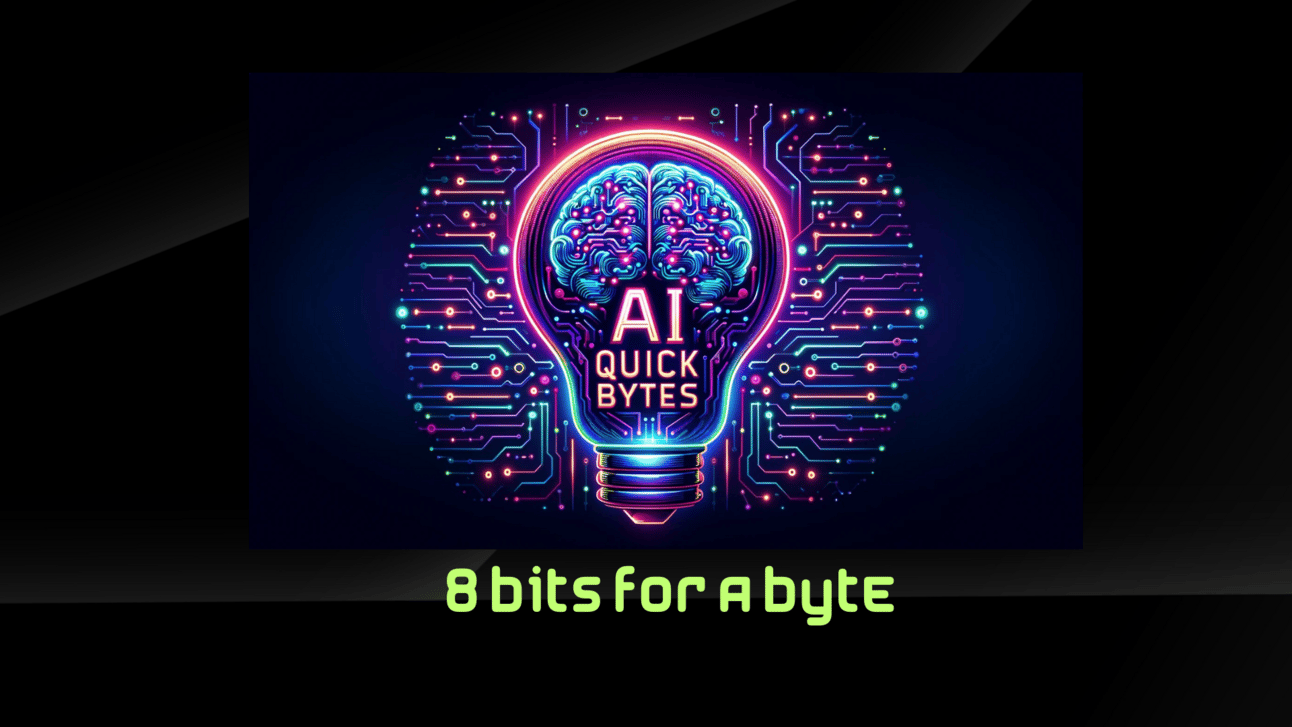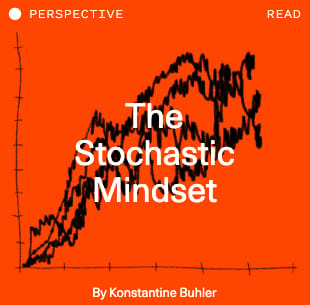Welcome to 8 bits for a Byte: This week, we’re diving into the future of AI: how leaders can anticipate breakthroughs instead of chasing trends, why trust and transparency will define AI success, and what South Korea’s bold new AI legislation means for global innovation. Plus, learn how to avoid “Product Market Fit Collapse” in an AI-driven market and why embracing the "stochastic mindset" is the key to thriving in a world of uncertainty. Stay informed, stay competitive—and don’t miss these actionable insights!
The future of presentations, powered by AI
Gamma is a modern alternative to slides, powered by AI. Create beautiful and engaging presentations in minutes. Try it free today.

Let’s Get To It!

Welcome, To 8 bits for a Byte!
Here's what caught my eye in the world of AI this week:
In "Machines of Loving Grace: How AI Could Transform the World for the Better," the CEO of Anthropic offers a hopeful, detailed vision of how powerful AI could drive a revolution in health, neuroscience, global development, governance, and meaning over the next 5–10 years. While acknowledging risks, the essay emphasizes the immense potential AI holds to improve the human condition, from curing diseases and eradicating poverty to advancing democracy and redefining work. The core message is clear: with the right effort and collaboration, AI can compress decades or even centuries of progress into just a few years, delivering a better future for humanity.
3 Key Takeaways:
1. Revolution in Health and Neuroscience
AI could compress 50–100 years of medical progress into a decade, accelerating breakthroughs in curing diseases like cancer, Alzheimer’s, and genetic disorders, while extending lifespans and advancing "biological freedom" (e.g., control over physical traits or aging).
Neuroscience will benefit from AI’s ability to understand brain function and mental illness, promising cures for conditions like depression, addiction, and PTSD, while enhancing baseline human cognition and emotional well-being.
2. AI as a Global Equalizer
AI offers tools to eradicate extreme poverty and ensure that developing countries benefit from health innovations, agricultural advancements, and economic growth—potentially achieving 20% annual GDP growth rates in some regions.
Challenges like corruption, infrastructure gaps, and public trust must be tackled for global equity, but AI could significantly narrow inequalities between the developed and developing world.
3. Democracy, Governance, and Meaning
AI can strengthen democracy by combating propaganda, enabling fairer legal systems, and improving access to government services. A coordinated "AI entente" among democracies could counter authoritarian AI misuse and promote global stability.
While AI might redefine work, the essay emphasizes human relationships, creativity, and self-actualization as the sources of meaning in a post-AI world, alongside the need to rethink economic systems to adapt to AI's transformative impact.
This essay calls for optimism tempered by responsibility: with deliberate effort, we can harness AI to unlock unparalleled opportunities for human progress while addressing its risks. The future isn't predetermined—but it's worth fighting for.dfedf
Author -Dario Amodei

Quote of the week
Teams need to plan product roadmaps in anticipation of what may be possible soon.
In the rapidly evolving landscape of AI, it’s not enough to chase the puck—you need to anticipate where it’s going. This requires visionary product and business leaders collaborating to deeply understand AI’s transformative potential. Success hinges on assembling teams comfortable with risk and failure, as these are inevitable components of building AI maturity. Enterprises should embrace experimentation, viewing failures not as setbacks but as opportunities to generate insights and foundational value for future initiatives.
The ultimate objective isn’t just delivering isolated AI solutions, but rather creating scalable, foundational frameworks that empower the entire organization. By focusing on reusable systems instead of one-offs, companies can accelerate AI’s impact, driving adoption in a compounding, viral fashion. This approach positions enterprises to lead, not follow, in the AI revolution.

The concept of Product Market Fit (PMF) is evolving rapidly in the age of AI, transforming from a stable milestone to a dynamic, volatile threshold. Brian Balfour introduces the phenomenon of "Product Market Fit Collapse," highlighting how AI's rapid advancements accelerate customer expectations, often disrupting established businesses. The collapse is evident in cases like Chegg and Stack Overflow, where AI-enabled solutions rendered traditional growth loops obsolete almost overnight. To survive and thrive, companies must anticipate changing customer needs, assess their risk of PMF collapse, and adapt their strategies with urgency.
Key Takeaways
AI Amplifies Market Disruptions
AI accelerates shifts in customer expectations, making PMF more volatile than ever before. Companies like Chegg and Stack Overflow saw rapid declines as AI solutions outperformed their traditional offerings with instant, personalized, and cost-effective alternatives.Understanding and Owning Customer Relationships Is Crucial
Companies that directly own customer relationships and embed themselves into primary workflows (e.g., GitHub with coding) are better positioned to weather AI-driven disruptions. Businesses reliant on intermediaries or low-frequency interactions are more vulnerable to collapse.Proactive Strategy Beats Reactive Adaptation
To avoid PMF collapse, organizations must:Continuously monitor micro- and macro-level customer expectation shifts.
Identify risks in their growth models, such as reliance on user-generated content or outdated workflows.
Bet boldly on innovation, prioritizing proprietary data and high-touch customer engagement to stay ahead of AI-infused competition.
By embracing these strategies, businesses can mitigate risk and leverage AI to redefine growth opportunities rather than succumb to disruption.
Author - Brian Balfor, Casey Winters, Fareed Mosavat

Embracing the Stochastic Mindset in the AI Era
AI is revolutionizing how we work, not just by automating tasks but by reshaping the way we think. The shift from deterministic (predictable) to stochastic (probabilistic) systems represents a seismic change in computing and work culture. This new “stochastic mindset,” introduced by Gabriel Hubert on Sequoia’s Training Data podcast, invites workers to embrace uncertainty, adapt to probabilistic outputs, and think more critically. By doing so, AI becomes an "exoskeleton" for work—amplifying productivity, creativity, and strategic thinking while demanding an evolutionary shift in how we approach problems, build tools, and navigate change.
Key Takeaways
The Stochastic Mindset: A New Way of Thinking
AI systems are moving away from deterministic outputs toward probabilistic ones, meaning workers need to embrace uncertainty and iterative workflows.This mindset enhances adaptability, critical thinking, and scientific approaches to problem-solving.
It favors experimentation, fast iteration, and skepticism over rote workflows, empowering workers to engage with AI as collaborators rather than tools.
AI as a Work Exoskeleton
AI provides leverage, not definitive answers—amplifying human productivity while demanding higher levels of abstraction and strategic thinking.Platforms like Dust, OpenEvidence, and Harvey enable knowledge workers to create custom agents and reduce friction in information access.
Workers and founders must see AI as an enabler, not a replacement, helping solve complex problems, enhance creativity, and manage volatility.
Adaptability is Key to AI Success
The rapid pace of AI development and uncertainty in its outputs require a flexible, growth-oriented approach.Founders need to anticipate AI-driven advancements and design products that help users adapt to evolving tools and challenges.
AI encourages more strategic and abstract thinking, shifting roles from repetitive tasks to creative problem-solving and high-level management.
By embracing the stochastic mindset, workers and businesses can turn uncertainty into opportunity, using AI as a partner in innovation and creativity. The future belongs to those who adapt, iterate, and thrive in an unpredictable world.
Author - Konstantine Buhler

Unlock the full potential of your workday with cutting-edge AI strategies and actionable insights, empowering you to achieve unparalleled excellence in the future of work. Download the free guide today!


Rafal Wilinski
Building effective AI agents is challenging—they can be costly, brittle, and prone to errors. However, by following proven principles, you can create agents that are powerful, reliable, and safe. AI agents differ from traditional AI in their ability to strategically plan and adapt in iterative loops. Success lies in implementing robust feedback mechanisms, modular designs, and strict guardrails to ensure agents deliver value without spiraling into unpredictable or risky behavior. Start small, optimize workflows, and prioritize reliability over unnecessary complexity.
Key Takeaways
Design with Feedback Loops and Modularity
Effective AI agents require robust feedback mechanisms and clear separation of tasks to operate reliably and efficiently.Feedback Loops: Agents should learn from errors, retry failed tasks, and validate outputs with tools like TypeScript for error handling before runtime.
Task Separation: Split planning (strategy creation) from execution (task implementation) to prevent context pollution and allow independent tuning of each phase.
Prioritize Guardrails and Security
AI agents need safeguards to operate within defined limits, avoid harmful outputs, and minimize risks in real-world scenarios.Guardrails: Validate inputs/outputs with tools like Pydantic, limit retries to prevent infinite loops, and use OpenAI Moderation API for harmful content detection.
Security: Use existing authentication mechanisms, sanitize prompts to prevent injection attacks, and restrict agent permissions to prevent unauthorized access or malicious behavior.
Streamline with Reusability and Oversight
Reusing proven solutions and incorporating human oversight can enhance agent reliability and efficiency.Reusability: Use semantic caching to store and reuse plans for repetitive tasks, saving compute resources and avoiding unnecessary regeneration of strategies.
Human Oversight: For critical or high-impact tasks (e.g., large refunds), integrate humans into the loop to validate actions before execution.
By focusing on these principles, teams can build AI agents that are scalable, cost-effective, and reliable, empowering businesses to harness the full potential of intelligent automation while mitigating risks.
Author - Rafal Wilinski


This is better than I could have done, enjoy
Sunday Funnies 🤣 .


Robert Franklin
Trust: The Cornerstone of AI’s Next Chapter
The rise of AI has taken us beyond mere tools—it’s now reshaping how we create, consume, and interact with content. From generating ideas to executing complex tasks, AI is rapidly transforming content into a low-cost commodity. But as this transformation unfolds, trust is emerging as the defining factor that will determine the leaders of the AI age. The companies that thrive over the next decade won’t just deliver cutting-edge AI—they’ll deliver confidence, accountability, and transparency to their users.
The New Content Ecosystem: Convenience at a Cost
AI-powered systems like GPT-4 and specialized agents are revolutionizing productivity. They allow users to generate polished content or solve intricate problems at unprecedented speed and scale. However, the byproduct of this efficiency is a flood of synthetic content that erases the line between human originality and machine creation.
For instance, professionals are now using AI to craft presentations and solve technical issues—tasks once fueled by human creativity and expertise. While this shift boosts convenience, it diminishes the distinctiveness of human input, creating a world where AI tools endlessly generate, remix, and repurpose content. As this ecosystem grows, trust becomes paramount—consumers need assurance that what they’re engaging with is reliable and authentic.
The AI Differentiator: Trust Will Decide the Winners
As the digital space becomes saturated with AI-driven outputs, trust will become the deciding factor for success. In a world of near-infinite content, authenticity and transparency will determine which companies thrive.
Authenticity as a Competitive Edge
The value of knowing a piece of content’s origin will rise sharply. Verifiable systems that establish a clear trail of how content was created and modified will set trusted platforms apart. The future isn’t about flashy logos or checkmarks—it’s about real, provable transparency.Ethical AI Wins Loyalty
Companies that show they care about ethical AI practices and data integrity will gain the loyalty of increasingly skeptical users. Customers are looking for more than functionality—they want to trust the tools they rely on.Trust is the Moat AI Must Build
AI systems that fail to address bias, hallucinations, and security risks will lose credibility fast. Organizations that invest in AI governance, robust guardrails, and user oversight will have a clear competitive advantage in a trust-first market.
How to Build Trust in an AI-Driven World
Winning the AI trust race requires more than just good algorithms. Companies must weave trust into their operational DNA.
Transparent Origins: Use technology that tracks and verifies the lifecycle of AI-generated content, providing users with confidence in its accuracy and provenance.
Ethical Guardrails: Integrate safeguards like human oversight for sensitive decisions, ensuring responsible and reliable use of AI.
Openness is Key: Clear communication about how your systems work and what data they rely on builds user confidence.
Adapt to Trust Shifts: As user expectations evolve, companies must continually refine their systems to meet the growing demand for authenticity and transparency.
The Future Belongs to Trusted Innovators
In the era of synthetic content and automated creativity, trust is more than a virtue—it’s the bedrock of success. Businesses that make trust a non-negotiable aspect of their AI offerings will set themselves apart in a crowded and rapidly evolving marketplace. The next decade will belong to those who understand that building trust isn’t just good ethics—it’s the key to building a sustainable competitive advantage in the AI-powered future.
Author - Robert Franklin, Founder AI Quick Bytes

Learn AI in 5 minutes a day
What’s the secret to staying ahead of the curve in the world of AI? Information. Luckily, you can join 1,000,000+ early adopters reading The Rundown AI — the free newsletter that makes you smarter on AI with just a 5-minute read per day.

South Korea has taken a bold leap in shaping the future of AI governance with the introduction of the AI Basic Act—a unified framework that consolidates 19 proposals into a single, visionary piece of legislation. This groundbreaking act not only mirrors the EU AI Act's focus on ethics, transparency, and risk management but also sets a new standard by integrating innovation-driven policies to fuel industrial growth and global competitiveness. With its forward-thinking emphasis on safeguarding rights, fostering trust, and building a thriving AI ecosystem, South Korea is positioning itself as a global leader in harmonizing cutting-edge technology with responsible regulation.
This landmark legislation is a clear signal of the regulatory trajectory for AI worldwide, offering a critical opportunity for companies to align their strategies proactively. By paying attention to South Korea’s AI Basic Act, organizations can not only prioritize what truly matters—ethics, transparency, and risk management—but also gain a forward-looking understanding of where global AI governance is heading. This foresight empowers corporations to stay ahead of the curve, innovate responsibly, and build systems that are not just compliant but also trusted and future-ready.
Check out South Korea, EU and Brazil Artificial Intelligence Acts.
Author - Jeremy Werner

Until next time, take it one bit at a time!
Rob
Thank you for scrolling all the way to the end! As a bonus check out a great overview of agents by Google.
P.S.
Join thousands of satisfied readers and get our expertly curated selection of top newsletters delivered to you. Subscribe now for free and never miss out on the best content across the web!








